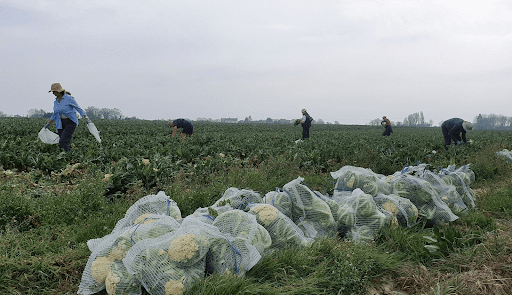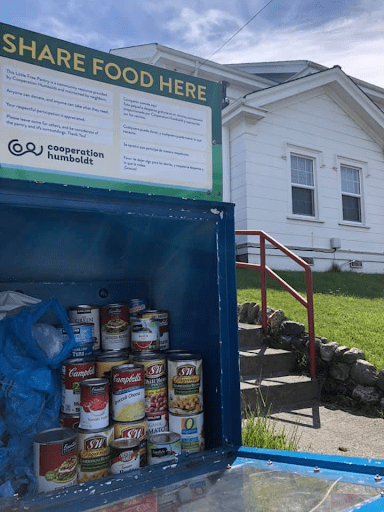“It is not possible to build food security in a few weeks’ time”.
“The Transition movement begs to differ.”
The past 12 years of the Transition movement is rich with learnings that can inform the discussions about ‘bouncing forward’. Groups have created new markets, connected farmers and growers with urban populations, created new vibrant farms, created detailed studies.
.
Bob Hopkins, co-founder of the Transition Town movement, looks at the extraordinary projects around food which have developed over the last decade – and the last weeks:
.
What the Transition movement can teach us about how to ‘bounce forward’
It is seven years since Crystal Palace Transition Town (CPTT) set up the Crystal Palace Food Market. It has gone on to win many awards as one of London’s finest food markets. They have built a new infrastructure, a family of traders, and sparked a more resilient food system, connecting traders, customers, food producers and growers close to, and within, the city. When COVID-19 arrived, the market team had to take the tough call whether to stay open or to close.
As the UK government was just beginning to consider how it might respond to COVID-19, CPTT, and Karen and Laura in the CP Food Market team, were ahead of government guidance, by weeks. The food market introduced social distancing way ahead of government guidance, to some customers’ bafflement. First they went to creating barriers to reduce transmission, then social distancing queues, then stricter queues with rather fetching circles painted on the pavement at 2 metre intervals, then changed the model to having different stalls on different days. Their website was rapidly overhauled to become a portal so regulars could order home deliveries from their favourite suppliers…
Food
Let’s start with food. Many Transition groups have been responding to the COVID19 crisis in emergency mode.
The Deal with It group in Deal (UK) have joined forces with other local groups and been working with local farmers, bringing volunteers to do ‘gleaning’, harvesting surplus that is uneconomic for the farmer to bother with. Last week they gleaned 3 tonnes of fresh produce in a week which was distributed to food banks and families in food need, while also maintaining their food garden beds on the local train station.

In the US, Transition Town Glassboro have taken to Zoom to run online food growing classes, as have Transition Wellington in the UK. Transition Town Port Washington in the US have been running online composting classes. Cooperation Humboldt (US) have been creating ‘Little Free Pantries’ for people to help themselves to donated food. They have also been building small food gardens for families in need, with over 90 requests so far. Transition Wilmslow are finding a lot more people want to get involved in their community allotment and are now planning a new, much larger, market garden.

Transition Loughborough’s community allotment has also been in full swing, and they have been mastering the art of social distancing on an allotment, while also having ‘virtual’ plant sales (with an honesty box and dropping plants at peoples’ front doors). Transition Town Bridport (UK) had been planning a day planting an edible hedge at the local St. Mary’s School. It was going to be a community day with tea, cake, and planting. But COVID-19 had different ideas, and instead the planting had to be done by a group of just 5 members who managed to plant the entire hedge, which included apples, pears, plums, figs, cherries and nut varieties whilst also maintaining social distancing. Sarah Wilberforce of TTB said “the hedge will create beautiful blossom in the Spring, and foraging of nuts and berries in the autumn.”
In Totnes, ‘Food In Community’ have been gathering grade-out food from Riverford Organic Farm (vegetables and fruit with blemishes or imperfections) and distributing them to organisations and people in food need. So far they have distributed over 8 tonnes of produce. As Chantelle Norton from the group told me, “it’s about people dignity, community food sovereignty and resilience”. The networks and partnerships that they had laid in advance of this crisis have proved invaluable in this new context.

While these projects are proving vital in the context of COVID19, how do they point a way forward to what comes next? To ‘bouncing forward’? Where do we see these projects taking concrete steps towards the building of new food systems and networks, to a reimagining of the food system? In Sweden, the Transition group in Soderhamn called Närjord (“local soil”) have started a campaign called Potatisuppropet (‘Potato Appeal’, or ‘Potato Uprising’). COVID19 highlighted the perilous decline in food self sufficiency in Sweden, now down to just 50%.
They were inspired by the story from Swedish history of the 1917 Potato Uprising where, during the First World War, with famines looming, a quarter of a million people, mainly women, took to the streets to demand food. The government gave out seeds and seed potatoes and food gardens sprang up everywhere. Advertising posters from the times carried the immortal slogan “everyone plants potatoes – except boring people”.

In the face of COVID19, the Swedish government stated “it is not possible to build food security in a few weeks’ time”. As Pella Thiel of the Swedish Transition Hub writes, “the Transition movement begs to differ”. The Närjord group bought 12 tonnes of seed potatoes, sold shares of the future harvest and gave away seed potatoes. They met with local authorities to instigate a more proactive approach to food security. The Swedish Hub then took the idea and rolled it out across Sweden as a simple idea. Firstly, plant a potato, secondly, tell the world about it, and thirdly ask your local authority what it is doing for food security. The response has been overwhelming.
Potatoes have been popping up in buckets outside local government offices and town squares. There has been a massive sharing of potato-growing techniques, potato songs, potato slogans. This simple act is also working hard to build a bridge to what the post-COVID world could look like. A very similar scheme is being promoted by Mantois en Transition in France as ‘Operation Potatoes’.
In Wales, Transition Llandrindod Wells just heard they got funding from the Lottery to create ‘Incredible Edible Llandrindod’. As Dorienne Robinson from the group put it, “We want to try and grow as much food throughout the town as possible. To this end we have liaised with Powys County Council who have been hugely helpful and allowed us to start our project on a disused tennis court in the centre of town. A large variety of vegetables and fruits will be grown in planters and would be for the public to pick and use. If successful the Council may be able to offer us more space.”
How is COVID-19 affecting one of the most ambitious food projects to emerge from the Transition movement, namely Ceinture Aliment-terre Liégeoise (the Liége Food Belt)? CATL is reimagining the food system for the city, co-ordinating 21 co-operatives ranging from vineyards and breweries to shops and delivery businesses. I asked Christian Jonet of CATL how COVID-19 had impacted their work. He told me it has led to a significant increase in demand for local food. “Most of the cooperatives in our network that accept online orders have seen their turnover triple in a couple of months”, he told me. This has required a lot of reorganisation, and reinforced the need for a new central logistics hub. On the downside however, other CATL projects such as the creation of sustainable chains in the city’s schools have been put on hold. The closure of the city’s restaurants have also been a big blow. CATL co-ops such as Rayon 9, the cooperative that makes deliveries by bicycle, has lost 80% of its customers – mainly restaurants. However, the increase in demand for deliveries for the other co-ops offset this. As Christian put it, “it’s hard to imagine what the future will look like, but for now, consumer demand for local products is exploding”.
The past 12 years of the Transition movement is rich with learnings that can inform the discussions about ‘bouncing forward’. Groups have created new markets, connected farmers and growers with urban populations, created new vibrant CSA farms, created detailed studies analysing the degree to which places could feed themselves. They have put in place new mills, have crowdfunded for new food businesses, created new food gardens in schools, done economic analyses of the impacts a shift towards more localised food chains would bring. How differently would we be thinking about food resilience and vulnerability now if those strategies had been more widely adopted and properly resourced?
What the Transition movement can teach us about how to ‘bounce forward’ | transitionnetwork.org